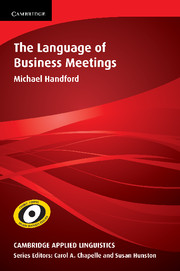Book contents
- Frontmatter
- Contents
- Series editors' preface
- Acknowledgements
- Transcription conventions
- 1 CANBEC: Corpus and context
- 2 Background: Theory and methodology
- 3 The business-meeting genre: Stages and practices
- 4 Significant meeting words: Keywords and concordances
- 5 Discourse marking and interaction: Clusters and practices
- 6 Interpersonal language
- 7 Interpersonal creativity: Problem, issue, if, and metaphors and idioms
- 8 Turn-taking: Power and constraint
- 9 Teaching and learning implications
- Appendix
- Index
7 - Interpersonal creativity: Problem, issue, if, and metaphors and idioms
Published online by Cambridge University Press: 05 April 2013
- Frontmatter
- Contents
- Series editors' preface
- Acknowledgements
- Transcription conventions
- 1 CANBEC: Corpus and context
- 2 Background: Theory and methodology
- 3 The business-meeting genre: Stages and practices
- 4 Significant meeting words: Keywords and concordances
- 5 Discourse marking and interaction: Clusters and practices
- 6 Interpersonal language
- 7 Interpersonal creativity: Problem, issue, if, and metaphors and idioms
- 8 Turn-taking: Power and constraint
- 9 Teaching and learning implications
- Appendix
- Index
Summary
Creativity is not always a word that springs to mind when thinking about work or business. Indeed, even developing the strategy of an organization, traditionally viewed as a highly creative endeavour (Mintzberg, 1994; Hamel, 2007) has recently been interpreted as a practice that managers become socialized into and perform within the constraints of the organizational context (Rigby, 2003; Johnson et al., 2007; Samra-Fredericks, 2009). However, according to de Bono, creativity is central to success in business:
Creativity is used to solve problems, resolve conflicts, simplify procedures, cut costs, improve motivation, design new products and services, and fashion strategies. Any situations that require thinking demand creativity. Without it, we are condemned to repeating the standard routines.
(de Bono, 2006 : 355)Of course, a considerable amount of the working day is made up of standard routines, several of which are explored in this study, allowing for an essential degree of efficiency that constantly creating everything anew would prevent. Nevertheless, de Bono highlights a crucial tension in business: how can business people deal with challenging, immediate situations, often categorizable as potential or actual problems, in real time in an effective way? While this is a huge, nebulous issue that demands a truly interdisciplinary approach, CANBEC data does allow for insights on creativity at the level of discourse through an analysis of the items problem, issue, if, and metaphors and idioms.
- Type
- Chapter
- Information
- The Language of Business Meetings , pp. 185 - 217Publisher: Cambridge University PressPrint publication year: 2010



